Class 12 Chemistry
Alcohols, Phenols and Ethers

Chemical properties of phenols
- Acidic nature of phenols –

- It is sp2 hybridized that is it has 33% s character and 67% p character that shows it is more electronegative . As a result electron density on oxygen decreases and Polarity of O – H bond increase therefore Hydrogen is not easily removed.
- Although phenol is acidic but it is less acidic than carboxylic acid therefore It doesn’t react with Na2CO3 and NaHCO3 but reacts with sodium metal as shown below.
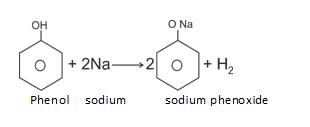
- As compared with alcohol, phenol is more acidic than alcohol. Because in alcohol it is sp2 hybridised in phenol and Sp3 hybridised C atom in alcohol.
- The phenoxide ion is resonantly stabilized due to resonance as shown :
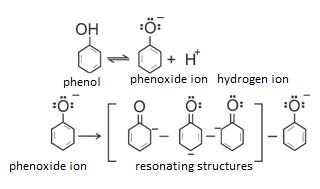
In this only one negative charge is getting dispersed.
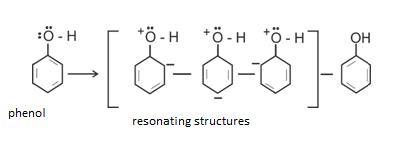
On the other hand:
C2H5OH --> C2H5 O- + H+
ethanol ethoxide ion
No such resonance is possible therefore stability of alkoxide is less than phenoxide as a result phenol has more tendency to form phenoxide ion due to which phenol is more acidic than alcohols.
If electron withdrawing group is present at ortho or para position like NO2 , CN , Cl etc then they disperse this negative charge and will enhance acidic strength, whereas if electron donating group’s like CH3, alkyl group, NH2 (amine) or OR etc are present they decrease the acidic strength.
1. Reacting with zinc dust: Benzene is formed .

(phenol) (Zinc) (benzene)
- Reaction with NH3: aniline is formed

- Reaction with Acid chloride: Phenyl ethanoate is formed .The reaction is called as acetylation. If we react this phenyl ethanoate with ethyl anhydride then we get aspirin :
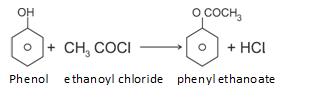

- Fries rearrangement
Phenyl ethanoate O – (hydroxy acetophenone)
- Shorten baumem reaction

(Phenol) ( benzoyl chloride) (phenyl benzoate)
In all these reaction cleavage takes place between O and H.
Reactions of benzene ring
In this Electrophile substitution reaction takes place .As we know OH- group is Ortho and Para directing so according to resonating structures the negative charge is on the Ortho and Para position. Therefore Electrophile attacks at O and P position.
Reactions involved:
- Bromination: Substitution by bromine
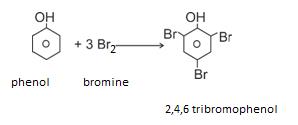
If it occurs in presence of CS2 then mixture of ortho and para isomers are formed:

- Nitration: Substitution by nitro group by adding nitric acid. If we use Concentrated HNO3 we get tri-substituted
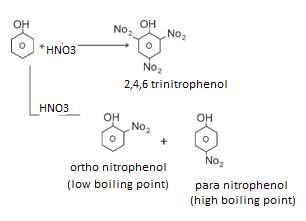
- Friedel craft alkylation reaction

- Sulphonation: Substitution by SO3H group.
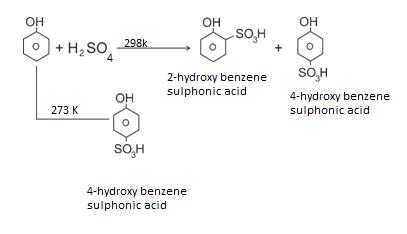
There are certain reactions that phenol undergoes –
- Kolbe’s reaction

By this Aspirin and salol can be formed a shown :
- Aspirin :
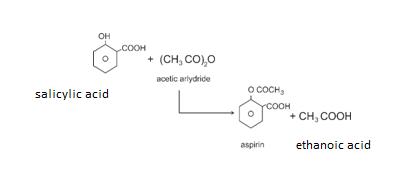
- Salol – phenyl salicylate
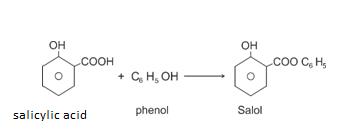
- Reimer – tieman reaction –
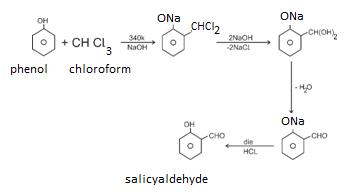
- Reaction with carbon tetra chloride
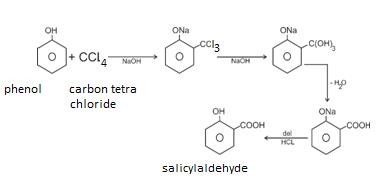
- Coupling reaction – in this we get dyes of different colours.
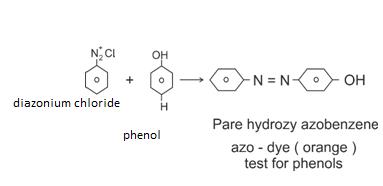
- Hydrogenation reaction –
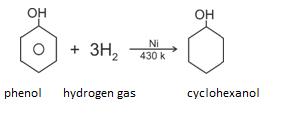
- With Zn dust
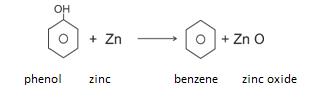
- Oxidation reaction

Class 12 Chemistry Alcohols, Phenols and Ethers NCERT Chapter 7 Free Notes for Best Revision
Revision of Class 12 Chemistry Alcohols, Phenols and Ethers is a crucial aspect of effective learning. Revision plays a vital role in the learning process and is especially important before exams. Here are some key points you can consider emphasizing in your content:
- Retention and Memory: Regularly reviewing and revisiting the material of Class 12 Chemistry Alcohols, Phenols and Ethers helps reinforce the concepts in students' minds. It strengthens memory pathways, making it easier to recall information during exams and beyond.
- Consolidation of Knowledge: When you revise notes, you are essentially consolidating your knowledge. This means connecting new information with what you already know, making the overall understanding more robust.
- Identifying Knowledge Gaps: Revision allows students to identify any gaps in their understanding or areas where they need further clarification. This gives you a chance to seek help or delve deeper into those topics. For detailed understanding, you can always refer to the videos of Alcohols, Phenols and Ethers Class 12 Chemistry NCERT Chapter 7 on LearnoHub.com
- Building Confidence: As you revise Alcohols, Phenols and Ethers Class 12 Chemistry and become more familiar with the content, your confidence in your abilities grows. Confidence is a crucial factor in exam performance as it reduces anxiety and allows you to approach exams with a positive mindset.
- Different Revision Techniques: Use a variety of revision techniques such as summarizing notes, creating flashcards, practicing past papers, discussing concepts with peers, and teaching others. Different techniques work for different students, and it's essential to find what suits you the best. You can also attend the LIVE Revision classes on LearnoHub.com or watch the LIVE Revision Race videos of LearnoHub on Alcohols, Phenols and Ethers Class 12 Chemistry NCERT Chapter 7.
- Spacing Effect: Spacing out revision sessions over time, rather than cramming all at once, has been shown to improve long-term retention. Create a revision schedule leading up to the exams to allow for spaced practice.
- Regular Revision over Cramming: Regular and consistent revision throughout the academic year is very important. Waiting until the last moment to cram everything can be overwhelming and less effective than spaced-out revision.
- Self-Assessment: Assess your understanding periodically through quizzes or self-tests. This helps you to gauge your progress and identify areas that need further attention. Refer Class 12 Alcohols, Phenols and Ethers Online Tests.
- Balanced Approach: Remind students to strike a balance between revision and other activities. Adequate rest, exercise, and relaxation are essential for optimal learning and performance.
- Seeking Help: If you face difficulties during the revision process, Refer the videos of Class 12 Chemistry Alcohols, Phenols and Ethers. Clearing doubts promptly is crucial for a better grasp of the subject matter. You can always ask your doubts on Alcohols, Phenols and Ethers Class 12 Chemistry NCERT Chapter 7. “Ask a Question” section of LearnoHub.com
By highlighting the benefits and strategies of effective revision, you can approach your studies more mindfully and achieve better results in your exams. Best of luck bachhon!
Class 12 Chemistry seems to be a quite difficult subject for a lot of students. But, if you get a very good conceptual understanding of the subject, it can be very interesting for you.
We, at LearnoHub, will give our best to make Class 12 Chemistry Alcohols, Phenols and Ethers NCERT Chapter 7 super-duper easy for you.
We aim at making learning fun as well as engaging for you with our complete end-end learning content with Alcohols, Phenols and Ethers Class 12 Chemistry Best videos, Notes, NCERT pdf, NCERT complete syllabus, tests and Practice Questions.
Always remember, it is very important to study with full concentration during Revision. Here are a few tips for you on how to revise with full focus:
- Create a Distraction-Free Environment: Find a quiet and comfortable place to study where you can minimize distractions. Turn off or silence your phone, log out of social media accounts, and inform others around you that you need uninterrupted study time. A dedicated study environment will help you focus better.
- Set Specific Goals: Before starting your study session, set clear and achievable goals. Break down your study material into smaller tasks, and plan what you want to accomplish during each session. Having specific goals will give you a sense of direction and purpose, making it easier to concentrate.
- Use the Pomodoro Technique: The Pomodoro Technique is a time management method that involves studying in short, focused intervals, typically 25 minutes, followed by a short break of 5 minutes. After completing four sessions, take a longer break of around 15-30 minutes. This technique can improve focus and productivity by providing regular breaks to recharge.
- Stay Organized: Keep your study materials, notes, and resources well-organized. Having everything you need at hand will save time and reduce distractions caused by searching for materials. Use color-coded folders or digital tools to maintain a structured study system.
- Practice Mindfulness and Meditation: Before you begin studying, take a few minutes to practice mindfulness or meditation. Deep breathing exercises and clearing your mind of distractions can help you approach your study session with a calm and focused mindset.
Remember, studying with full concentration is a skill that takes time and practice to develop. If you find your mind wandering during study sessions, gently bring your focus back to the task at hand and be patient with yourself. With consistent effort, you can improve your ability to concentrate and make the most of your study time.
Last but not the least, To get the best hold on Class 12 Chemistry Alcohols, Phenols and Ethers Book Chapter 7. Do not forget to check out:
- Alcohols, Phenols and Ethers Class 12 Chemistry Best videos
- Alcohols, Phenols and Ethers Class 12 Chemistry NCERT Solutions
- Class 12 Chemistry Alcohols, Phenols and Ethers Revision notes
- Alcohols, Phenols and Ethers Class 12 Chemistry DPPS, Download PDF of solutions
- Class 12 Chemistry Alcohols, Phenols and Ethers Online Tests
- Class 12 Chemistry Sample papers